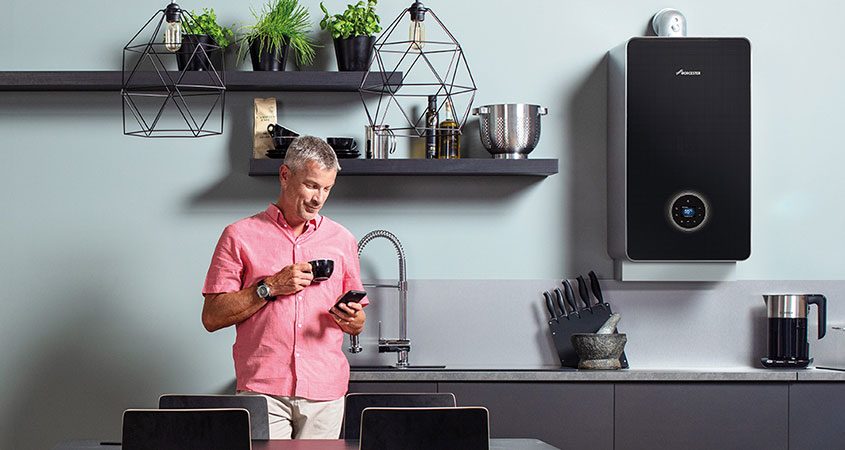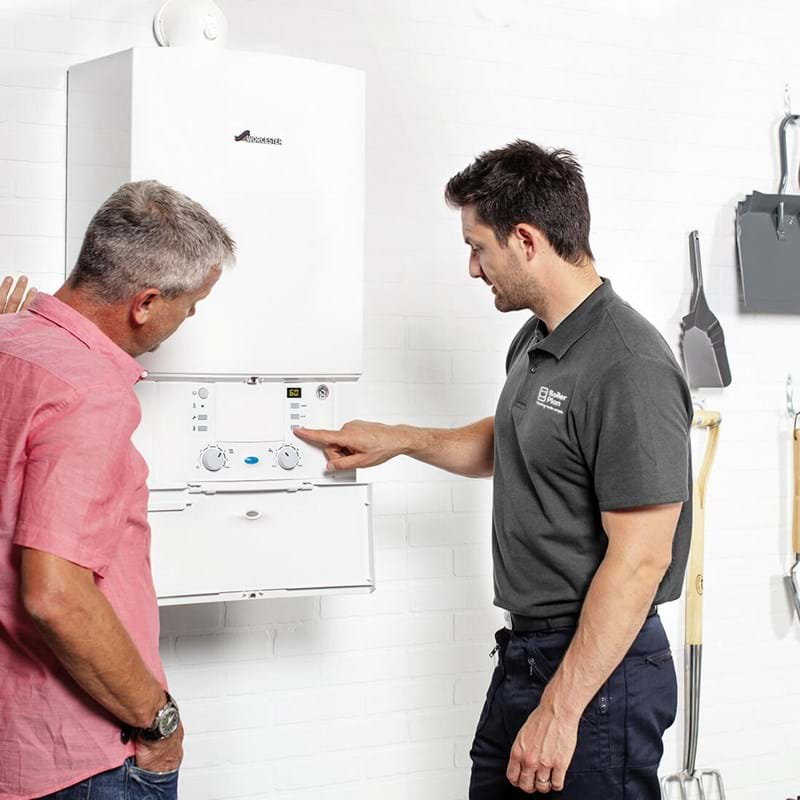Regular Boiler Installation & Replacement in London
A regular or heat only boiler, also known as a conventional boiler, is a type of boiler that is commonly found in older homes. It is called a “heat only” boiler because it only provides heating to the radiators and hot water to the taps, rather than providing hot water on demand.
A regular boiler consists of three main components: a boiler, a hot water cylinder, and a cold water tank. Cold water from the mains supply is stored in the cold water tank, which is usually located in the loft or attic. From there, the water is fed into the hot water cylinder, where it is heated by the boiler. The hot water is then stored in the cylinder until it is needed, and when hot water is required, it is drawn off from the cylinder and distributed to the taps.
The regular boiler also heats water for the radiators, which is distributed through a network of pipes. The boiler is usually located in a separate room, such as a utility room or kitchen, and can be powered by gas, oil or LPG.
While regular boilers are effective at providing heating and hot water, they do have some disadvantages. They require more space than other types of boilers, as they need a separate hot water cylinder and cold water tank, and can be less energy-efficient, as they heat and store hot water even when it is not needed. However, they are often still used in older homes, where upgrading to a more modern heating system may not be practical or cost-effective.







Looking For Boiler Installation or Replacement in London and are not sure which boiler type you need?
Whether you are looking to replace a combi boiler, install a new gas boiler, or totally fit a full home heating system in London and surrounding areas, we can do complete replacement and boiler installation for you.
A new boiler installation is an investment that in the long run can save you money over time, as it’ll be more efficient and suitable for your home therefore, over time it will pay for itself. Our team of experts can help you choose the ideal boiler for your property to suit your needs.
We are experienced at installing, Ariston, Alpha, Baxi, Chaffoteaux, Danfoss, Everflow, Ferroli, Glowworm, Grundfoss, Honeywell, Halstead, heatline, Ideal, Keston, Main, Potterton, Ravenheat, Vaillant, Worcester Bosch and many
Our local plumbers and London gas-safe engineers are experienced, qualified, and ready to install all types of boilers. If you need a new boiler or boiler repair, do not hesitate to contact Hub Heating team today, we can have our local engineers with you in no time.
Which Boiler? Check out our easy guide to help you make up your mind

Regular boiler Installation FAQs
Regular boilers are one of the oldest types of boilers around. They are also known as ‘traditional’ or ‘conventional’ boilers. In the industry, they are known as ‘heat only’ boilers, because they will produce hot water for central heating, but not for domestic use, i.e. taps, baths or showers.
A regular boiler is fed cold water from a water storage cistern (commonly called a ‘tank’) which is stored in the attic. It also requires a hot water storage cylinder to be able to provide hot water for daily use.
Hire Hub Heating to install Your Regular boiler:
If you’re looking for a reliable boiler installation company in London to install a new boiler at a fair price, we’ve got you covered. With our experienced gas engineers, you can be confident you’ll get a great installation deal. No matter what your requirements are, we will guide you to pick the best brands and models of boilers that suit your home at a fixed, fair price.
We Make sure that we are ready to install your new system fully and test every new boiler installation to make sure it works to your satisfaction and our engineers always have your best interests in mind.
A regular or heat only boiler works by heating water that is stored in a hot water cylinder and supplying it to the taps and radiators as required. Here are the basic steps of how a regular boiler works:
Cold water is stored in a tank, usually located in the loft or attic, and is fed down to the hot water cylinder.
When hot water is needed, a valve opens and allows the cold water to flow into the hot water cylinder, displacing the hot water that is stored in the cylinder and sending it to the taps.
The boiler, which is usually located in a separate room, such as a utility room or kitchen, heats the water in the hot water cylinder.
The heated water is circulated through a network of pipes to the radiators, where it releases heat and warms up the rooms.
A thermostat controls the temperature of the water in the hot water cylinder and the radiators, ensuring that they are heated to the desired temperature.
When the hot water in the cylinder has been used up, the boiler heats up more water to replace it, and the cycle begins again.
Regular boilers are often powered by gas, oil or LPG, and can be controlled by a timer or thermostat to ensure that they only heat up the water and radiators when needed, reducing energy waste and lowering energy bills. While regular boilers are less energy-efficient than modern heating systems, they are still a popular choice in older homes, where upgrading to a more modern heating system may not be practical or cost-effective.
The main difference between regular and system boilers is how they deliver hot water. Here are the key differences between the two types:
Hot water storage: Regular boilers require a separate hot water cylinder to store hot water, while system boilers have a built-in hot water cylinder. This means that system boilers take up less space in the home and do not require a separate cold water storage tank.
Water pressure: Regular boilers rely on gravity to deliver hot water to the taps, which means that the water pressure can be lower than with a system boiler. System boilers, on the other hand, are connected directly to the mains water supply, which provides a constant and reliable flow of hot water with good water pressure.
Installation: Installing a regular boiler can be more complex than installing a system boiler, as it requires a separate hot water cylinder and cold water storage tank. This can make the installation more time-consuming and expensive. System boilers, on the other hand, are easier to install, as they only require a single unit and do not require a separate tank.
Energy efficiency: System boilers are generally more energy-efficient than regular boilers, as they heat water directly from the mains supply, rather than storing hot water in a separate cylinder. This means that less energy is wasted in heating and storing water, resulting in lower energy bills.
Maintenance: Regular boilers require more maintenance than system boilers, as they have more components that can wear out over time. In contrast, system boilers have fewer components and are generally easier to maintain.
Overall, system boilers are a more modern and efficient solution than regular boilers, as they provide hot water on demand and are generally more space-saving and easier to install. However, regular boilers are still a popular choice in older homes, where upgrading to a more modern heating system may not be practical or cost-effective.
The main difference between regular and combi boilers is how they deliver hot water and provide heating. Here are the key differences between the two types:
Hot water storage: Regular boilers require a separate hot water cylinder to store hot water, while combi boilers do not require a separate cylinder. Instead, they heat water on demand as it is needed, so there is no need for a hot water storage tank.
Space-saving: Combi boilers are generally more space-saving than regular boilers, as they do not require a separate hot water cylinder or cold water storage tank. This makes them ideal for smaller homes or properties with limited space.
Water pressure: Combi boilers are connected directly to the mains water supply, which provides a constant and reliable flow of hot water with good water pressure. Regular boilers, on the other hand, rely on gravity to deliver hot water to the taps, which means that the water pressure can be lower.
Installation: Installing a combi boiler is generally quicker and easier than installing a regular boiler, as it only requires a single unit and does not require a separate tank. However, the installation can be more complex if additional pipework is required.
Energy efficiency: Combi boilers are generally more energy-efficient than regular boilers, as they only heat the water that is needed at the time, rather than storing hot water in a separate cylinder. This means that less energy is wasted in heating and storing water, resulting in lower energy bills.
Heating: Regular boilers are designed to provide heating to radiators and hot water to taps, whereas combi boilers are designed to provide heating and hot water from a single unit.
Overall, combi boilers are a more modern and efficient solution than regular boilers, as they provide hot water on demand and are generally more space-saving and energy-efficient. However, regular boilers are still a popular choice in older homes, where upgrading to a more modern heating system may not be practical or cost-effective, and where a separate hot water cylinder may be required for a high demand of hot water.
The cost of installing a new boiler or boiler replacement is based on 3 parts, new boiler & flue cost, installation cost and other requirements, for example installing a new radiator.
At Hub Heating we always work hard to keep the installation cost as low as possible, our quotes are honest, fair and affordable. We only charge for the work we do and all costs are calculated based on your current heating system and any new requirements you may need.
The cost of a new boiler depends on the boiler type and size, we will advise you on the best system for your home, whether you are planning to fit combination boiler, system boiler or regular boiler. When it comes to the installation and replacement of new boilers, we go above and beyond to ensure that you get the best possible price and five-star service for your home’s heating systems.
Our boiler installation service includes all you need to get your new system up and running, with minimal disruption to you and your family.
Our engineers offer an extensive range of services across London and are here to ensure that your boiler is running smoothly in a matter of days. If you’d like to find out more about what’s included in our boiler installation service, and what services our estimates cover, don’t hesitate to get in touch. We’re here to talk you through the whole process, and make sure it’s as simple and stress-free as possible.
We’ll always aim to get your new boiler installed in a single day. That means minimum disruption to you because, during the installation process, there will be no hot water or heating.
Sometimes installation jobs do take longer, but ordinarily even the most complicated boiler installations will not take longer than three days. We’ll keep you updated every step of the way, from the first inspection and throughout the job to let you know exactly what the impact of the boiler installation will be.
Of course! our engineers are well experienced in every boiler we install and know it inside out, so we can advise you on how different makes and models will perform for your requirements. Feel free to ask our engineers for advice on the best boiler for your home.
London Gas Boiler Emergency Repairs and Service
Has your boiler broken down and needs repairing?
We understand boilers can break down any time without any prior warning and no one likes not having access to hot water, especially in the cold months. Give us a call and we’ll send out one of our engineers to assess the issue and help repair your boiler.
At Hub Heating, we offer emergency boiler repair service so you won’t be waiting for long until your boiler is repaired. Our prices are competitive and we make sure you get the best boiler repair deal. We aim to fix your boiler fast and if you decide to install a new boiler, be sure we can help.
Our boiler replacement and repair services in London and the surrounding areas include:
Boiler & Water Heater Service, Fault Diagnosis & Repair. Installation of Cookers, Gas Fires & Hobs. Full Central Heating Installations. Un-vented systems. Conventional Systems. Combination Boilers. Cylinders, Pumps, Water Tanks, Radiators, Controls. Gas Leaks. Leaks and Component Repair in Central Heating System. Landlord's Gas Safety Checks. Power-Flushing. Plumbing Work- Showers, Sinks, Taps, Shower Pumps, Bathrooms. Pre-Purchase Reports. Free Estimates on New Installations. Worcester Bosch Trained Specialists & Installers.
We specialise in repairing all types of boiler breakdowns, including:
Alpha • Ariston • Baxi • Biasi • Ferroli boiler • Glow Worm • Halstead • Honeywell • Ideal • Keston • Potterton • Vaillant • Vokera • Worcester Bosch
- Boiler Repair & Fault Finding
- Radiator Installation
- Radiator Maintenance
- Thermostats & Central Heating Controls
- Thermostatic Valves
- Powerflush
- Landlord gas inspection
- Central Heating Pump
- Immersion Heaters
- Boiler Installation & Replacement
- Boiler Servicing
- Gas Safety Certificates
- Central Heating Repair & Upgrade
- Central Heating Installation
Why choose Hub Heating Boiler Installation & Replacement Services ?
We are a local business with more than 15 years of experience, our engineers are honest, reliable, and provide affordable prices. All Hub Heating gas engineers are fully qualified and ready to help you. We aim to have you as a long-term customer that's why we treat every client as a friend, making sure we are available to answer all after-installation questions and provide any assistance needed.
Very efficient service Thoroughly checked the hose and confirmed there was no internal leak from our boiler, they fixed all and cleaned it afterward, very pleased with their services, all were done as requested.
Fast, Local Services
Certified Engineers
No Call out Change
Get Fixed Priced boiler Installation
Pros and Cons of regular boilers
Regular boilers, also known as conventional or heat-only boilers, have several advantages and disadvantages. Here are some of the pros and cons of regular boilers:
Pros:
Suitable for larger homes: Regular boilers are ideal for larger homes with multiple bathrooms, as they can provide hot water to multiple outlets at the same time.
Can be more efficient with renewable heating: Regular boilers can be more efficient than other types of boilers when combined with renewable heating systems, such as solar thermal or heat pumps.
Can be more cost-effective: Regular boilers can be a more cost-effective option than other types of boilers in areas where gas prices are low.
Can be compatible with older heating systems: Regular boilers can be a good choice for older homes with existing heating systems, as they can often be integrated with existing components.
Cons:
Space-consuming: Regular boilers require a separate hot water cylinder and cold water storage tank, which can take up a significant amount of space in a home.
Limited hot water supply: Regular boilers can run out of hot water if the hot water cylinder is emptied, which means that the supply can be limited.
Can be less energy-efficient: Regular boilers can be less energy-efficient than other types of boilers, as they store hot water in a cylinder, which can result in heat loss.
More complex installation: Regular boilers can be more complex to install than other types of boilers, as they require a separate hot water cylinder and cold water storage tank.
Overall, regular boilers can be a good choice for larger homes with multiple bathrooms and for homeowners in areas where gas prices are low. However, they can be less energy-efficient and take up more space than other types of boilers, and they may require a more complex installation.
Why My Boiler makes Gurgling noises
How to stop your Boiler gurgling noises? Boiler Gurgling noises are a sign that air has become trapped inside the
READ MOREWhy My Boiler Is Not Working? Here is Why and How to Get Help
Why My Boiler Is Not Working? Here are the most common reasons and how to get your boiler repaired if
READ MORE